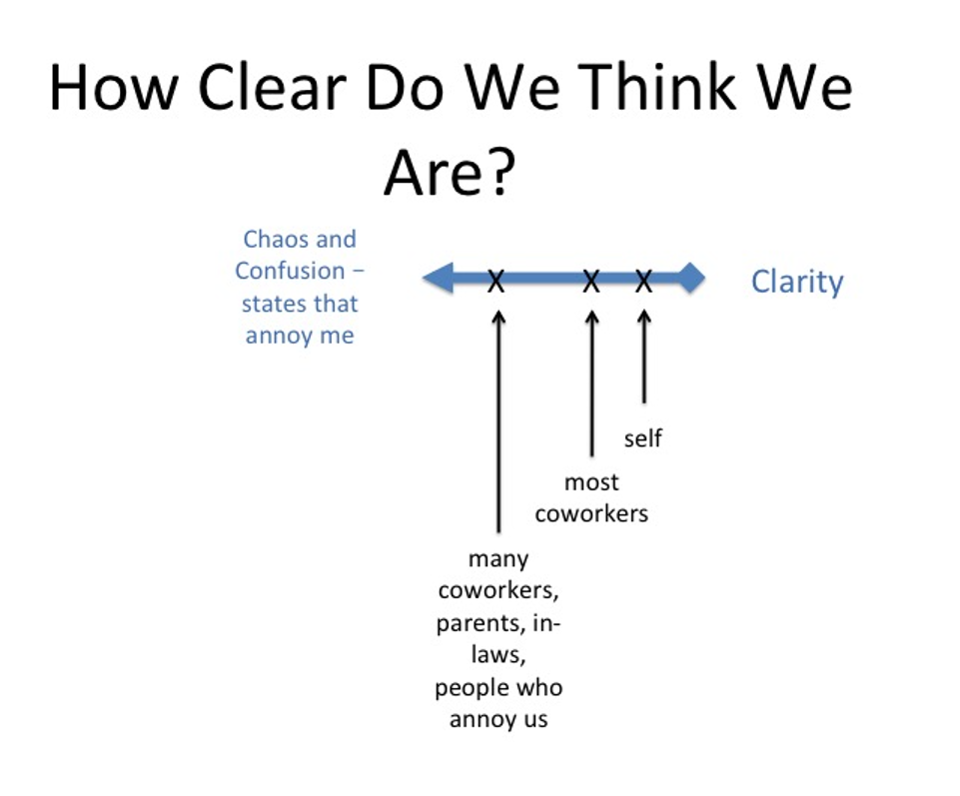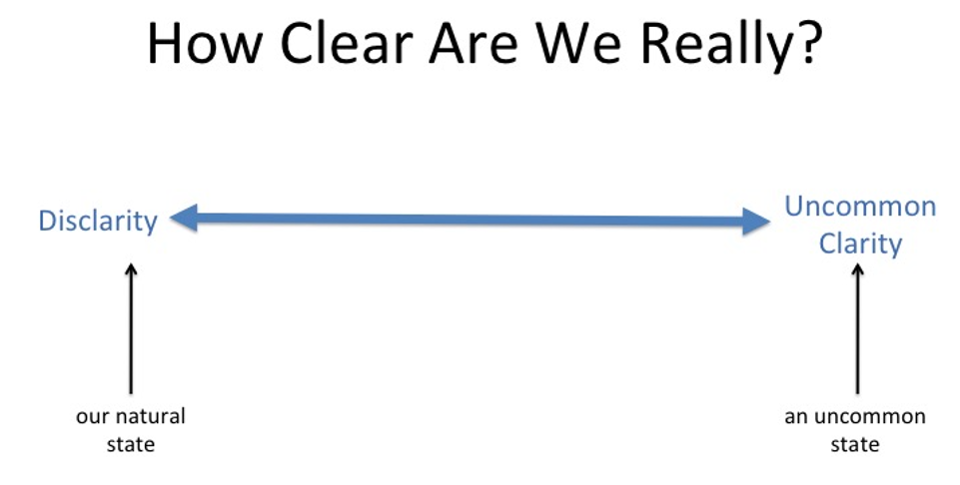 A ‘lack of clarity’ sounds like something is just a little off. Like a lack of spice, where the perfect pinch would elevate an otherwise exquisite dish to greatness.
A ‘lack of clarity’ sounds like something is just a little off. Like a lack of spice, where the perfect pinch would elevate an otherwise exquisite dish to greatness.
Or a ‘lack of light.’ Not darkness. No, just not quite enough light to see really well. Just a little lacking.
Everyone knows that light and darkness fall on a continuum. And we all have many shared words for describing positions along that continuum. Black of night, candlelight, twilight, bright and sunny, in the spotlight, and blinded by the light, to name a few. Each conjures an image distinct from the others and with a meaning shared by most people.
Clarity also falls on a continuum. That’s pretty obvious, but we don’t have a shared language to talk about it. Nor a sense of the breadth of the spectrum. Clarity seems to be on the positive end. Most people believe they could be clearer. They lack a little something.Chaos, confusion, and discord, on the other hand, are on the negative end. But even these words are incredibly unclear. They don’t conjure distinct images. They don’t have shared meanings. One person’s sense of chaos is another person’s norm. One person’s sense of confusion goes unnoticed by many. One person’s sense of discord is another person’s healthy debate.
The word clarity is simply unclear. We don’t have an effective vocabulary to relate to the continuum of clarity.
For example, when I tell people my company is called Uncommon Clarity, most react with, “Ah, I could sure use some of that!” because they know clarity is a good thing. It’s like mom and apple pie. But they don’t really know what clarity is. They assume they could be clearer. They are pretty sure others with whom they work could be clearer. But without any sense of the spectrum of clarity, or a shared vocabulary to discuss it, they have no idea how clear they really are or what they are missing.

It’s time to bring clarity out of the darkness. We need a shared vocabulary to talk about it. We can’t make significant strides in improving clarity if we don’t recognize the breadth of the spectrum and see where we stand. Thus, I’ve coined a term specifically to bring clarity to the spectrum and the word clarity itself, and that term is Disclarity. That’s the far left end of the spectrum and it represents a serious lack of clarity.
On the far right, we have a state that is most uncommon. Thus, I call it Uncommon Clarity. Sometimes I call it Radical Clarity because it represents a whole new level of clarity.

Now, what if I told you our natural state is disclarity. We are not wired to create clarity. We are wired to open our mouths and produce an abundance of ideas. We are wired:
- To be curious and ask wide-ranging questions.
- To be helpful and offer a multitude of suggestions.
- To be excited and blurt out a new idea.
- To be reminded of something and go off on a tangent.
- To hear what we want to hear.
- To direct with trepidation because we want to know that others agree with us.
- To relate with stories of our own experiences.
- To repeat ourselves because we want to be heard.
- To daydream and miss what others are saying.
- To block out the conversation when we feel threatened or embarrassed.
- To make jokes for comic relief or to bask in the attention.
We just aren’t wired to create the level of specificity needed for Uncommon Clarity, the focus needed for Uncommon Clarity, or the synchronicity needed for Uncommon Clarity. These hallmarks of Uncommon or Radical Clarity truly are uncommon. Furthermore, the more dedicated, articulate, vested, and determined your team is, the more different directions they can lead you! We aren’t wired to create clarity. Our natural state is disclarity.
Have I told you about the smart, focused, serious, articulate executive teams that I’ve heard discussing 5 distinct decisions and 2 different plans simultaneously without realizing it? Or the highly competent and earnest engineers who thought they were on the same page until I asked them if they had just agreed to ‘squinch the squatch,’ or some such thing, and one said ‘yes’ while the other said ‘no’? Have you noticed how many hours are wasted because we speak in treadmill verbs? Or the hours spent making and re-making decisions? We aren’t wired to create clarity!
However, clarity is the secret to greater profits, performance, productivity, engagement, commitment, and confidence. As long as we think we are just ‘lacking a little clarity,’ we will continue to operate with the illusion of clarity while under the burden of great disclarity. Start recognizing the disclarity. Call it by name. If you can’t see it, can’t recognize it, and can’t call it by name, you will never reduce it. And your profits, performance, and productivity will continue to suffer.
Ann Latham is an expert on strategic clarity and author of The Clarity Papers.
Take The Clarity Quiz! Actually, take them all! Download a free copy of The Clarity Quiz Collection.
![]()
This article first appeared on Forbes, February 25th, 2018.


Comments are closed.